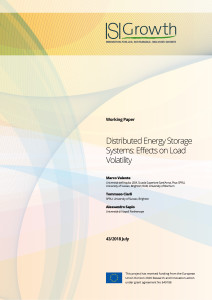The diffusion of distributed energy producing systems relying on renewable sources poses a challenge to policy-makers, grid operators, and power generating companies in the electricity industry. One such case may be the diffusion of distributed storage systems integrated with photovoltaic units owned by households. On the one hand, they may act as a buffer and smooth the intradaily variation in electricity flows through the network. On the other hand, they may increase volatility, if a large number of distributed generators simultaneously use the network once their batteries are fully discharged, by amplifying energy demand shocks. Under the latter hypothesis, the system costs would grow due to a need for larger back-up and transmission capacity, questioning the aggregate advantages of distributed storage systems. This work presents a stylised agent-based model to assess the likelihood of the two alternative effects of distributed storage systems of aggregate energy demand volatility, under dif- ferent parametrisations of the power generation storage systems. The results suggest that distributed storage systems reduce fluctuations, and are thus beneficial at a systemic level, rejecting the volatility increase hypothesis. Further explorations through richer simulation models of the electricity system are welcome.
Distributed Energy Storage Systems: Effects on Load Volatility
Marco Valente
Università dell’Aquila; LEM, Scuola Superiore Sant’Anna, Pisa; SPRU, University of Sussex, Brighton; RUB, University of Bochum
Tommaso Ciarli
SPRU, University of Sussex, Brighton
Alessandro Sapio
Università di Napoli Parthenope

